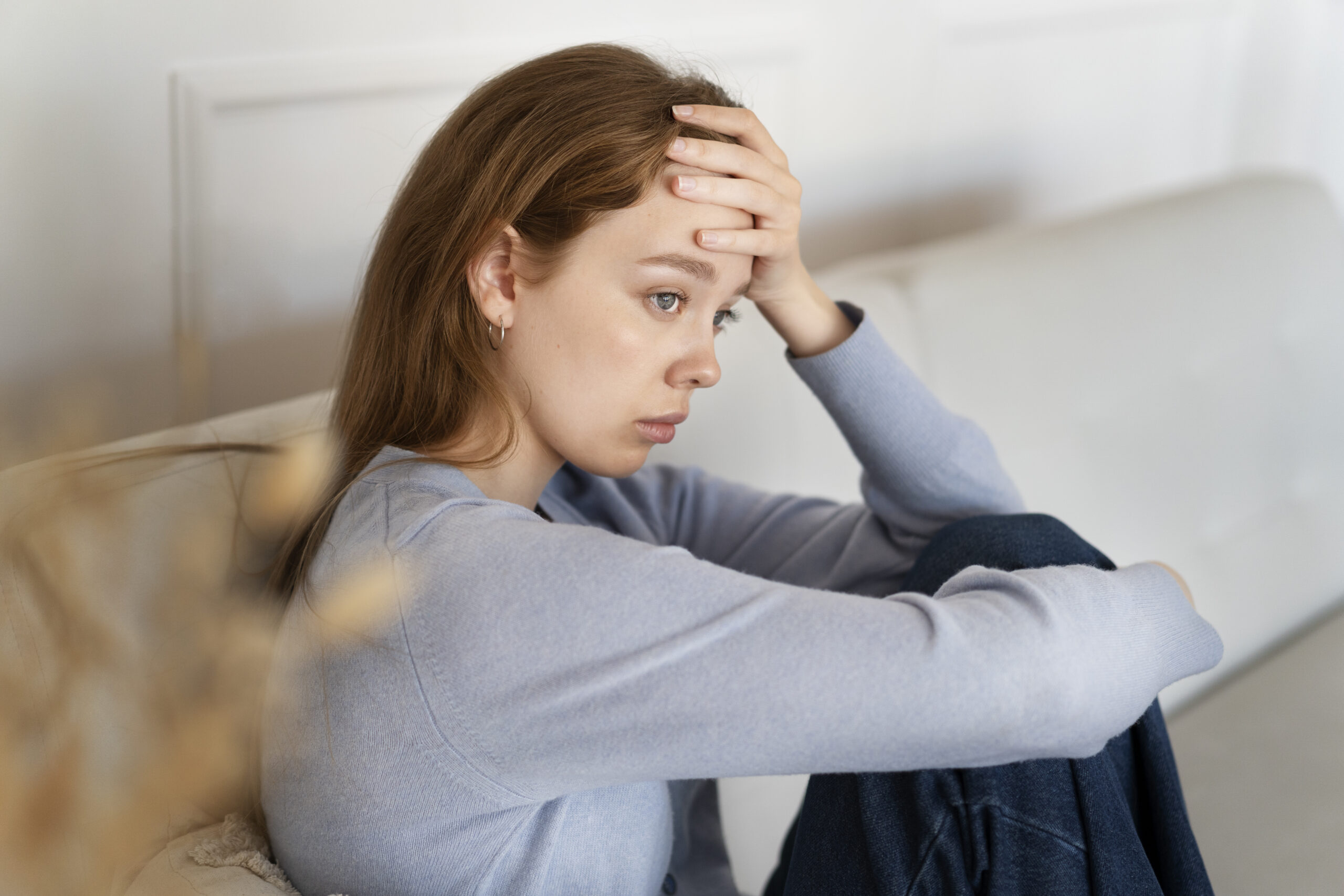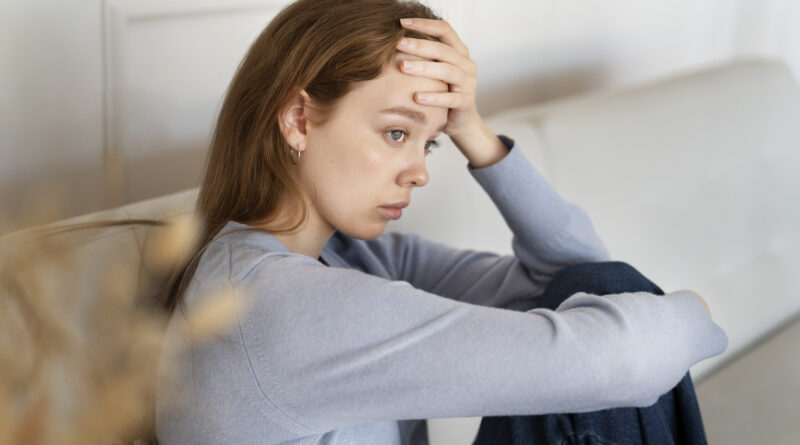7 Surprisingly Effective Natural Ways to Relieve Anxiety Fast
Anxiety is a widespread mental health condition that affects millions of people worldwide. It is characterized by persistent worry, fear, and excessive nervousness, often accompanied by physical symptoms such as rapid heartbeat, sweating, and restlessness.
While there are various treatment options available, many individuals seek natural ways to relieve anxiety quickly. In this article, we will explore seven surprising and effective natural ways to relieve anxiety fast and promote a sense of calm and well-being.

Image by Freepik
Here are Some Effective Natural Ways to Relieve Anxiety Fast
1. Exercise Regularly: Release Endorphins and Reduce Anxiety
Regular exercise not only benefits physical health but also plays a vital role in managing anxiety. Engaging in physical activity stimulates the release of endorphins, which are natural mood boosters.
These substances aid in stress reduction and facilitate relaxation. Strive to engage in moderate-intensity exercise, like brisk walking, jogging, or cycling, for a minimum of 30 minutes on most days of the week.
By incorporating exercise into your routine, you can significantly reduce anxiety levels and improve overall mental well-being.
2. Practice Deep Breathing Techniques: Calm Your Mind and Body
Deep breathing exercises are simple yet powerful techniques that can instantly calm your mind and body, reducing anxiety.
Locate a serene and cozy area where you can either sit or recline. Close your eyes and inhale deeply and gently through your nostrils, allowing your abdomen to expand. Hold your breath for a brief moment, and then exhale gradually through your mouth, releasing any built-up tension or stress.
Repeat this process several times, focusing on your breath and allowing yourself to relax deeply. Deep breathing exercises can be practiced anywhere, anytime, making them an easily accessible tool for anxiety relief.
3. Utilize Herbal Remedies: Natural Supplements for Anxiety Relief
Nature provides us with a wide range of herbs and botanicals that possess calming properties and can help reduce anxiety. Some popular herbal remedies include:
- Chamomile: Known for its soothing effects, chamomile tea can promote relaxation and reduce anxiety symptoms.
- Lavender: Lavender essential oil or dried lavender can be used in aromatherapy to induce a sense of calmness and alleviate anxiety.
- Valerian Root: Valerian root supplements are commonly used to promote better sleep and reduce anxiety.
- Passionflower: Passionflower extract is known to have anxiety-reducing effects and can help improve sleep quality.
Before incorporating herbal remedies into your routine, it is essential to consult with a healthcare professional, especially if you are taking any medications or have underlying health conditions.
4. Try Mindfulness Meditation: Cultivate a Calm and Focused Mind
Mindfulness meditation is a technique that involves directing your attention to the present moment without passing judgment. By nurturing mindfulness, you can cultivate a heightened sense of self-awareness and alleviate anxiety.
Find a peaceful environment and assume a comfortable seated position, either closing your eyes or softly fixing your gaze on a focal point. Begin by focusing your awareness on your breath, simply observing each inhalation and exhalation without attempting to alter it.
When thoughts or distractions arise, acknowledge them without judgment and gently guide your attention back to your breath. Regular practice of mindfulness meditation can train your mind to relinquish anxious thoughts and foster a state of inner tranquility.
5. Prioritize Sleep and Rest: Recharge Your Body and Mind
Adequate sleep and rest are crucial for maintaining optimal mental health and reducing anxiety. Lack of sleep can contribute to heightened stress levels and worsen anxiety symptoms.
Create a regular sleep schedule by adhering to consistent bedtimes and wake-up times every day. Create a relaxing environment in your bedroom, free from distractions, and practice good sleep hygiene habits such as avoiding screens before bed and keeping the room cool and dark.
Prioritizing restful sleep allows your body and mind to rejuvenate, leading to improved overall well-being and a greater ability to manage anxiety.
6. Maintain a Balanced Diet: Nourish Your Body for Optimal Mental Health
Our dietary choices play a crucial role in our mental well-being. Embracing a well-balanced diet that is abundant in vital nutrients can contribute to optimal brain function and diminish anxiety. Make it a point to include the following foods in your meals:
- Fatty Fish: Salmon, mackerel, and sardines are high in omega-3 fatty acids, which have been shown to reduce anxiety symptoms.
- Complex Carbohydrates: Whole grains, legumes, and vegetables provide a steady release of energy and promote stable mood and emotions.
- Leafy Greens: Spinach, kale, and other leafy greens contain magnesium, which plays a crucial role in regulating stress and anxiety.
- Probiotic-Rich Foods: Yogurt, sauerkraut, and kefir support a healthy gut microbiome, which has been linked to improved mental well-being.
By nourishing your body with nutrient-dense foods, you can support your mental health and reduce anxiety naturally.
7. Engage in Social Support: Seek Emotional Connection and Understanding
Social support is an essential aspect of managing anxiety. Connecting with others who understand your experiences can provide comfort, validation, and a sense of belonging.
Reach out to trusted friends, family members, or support groups to share your feelings and seek guidance. Additionally, consider professional support from therapists or counselors who specialize in anxiety treatment.
Engaging in open conversations and receiving support can significantly alleviate anxiety and promote emotional well-being.
Frequently Asked Questions (FAQs)
Q1: Are these natural remedies effective for all types of anxiety disorders?
A1: While these natural remedies can be helpful for managing mild to moderate anxiety, it is crucial to consult with a healthcare professional for a comprehensive assessment and personalized treatment plan, especially if you have a diagnosed anxiety disorder.
Q2: Can these natural methods replace the medication for anxiety?
A2: Natural methods can complement conventional treatment approaches but should not be considered a replacement for prescribed medication. It is essential to discuss any changes or additions to your treatment plan with a healthcare professional.
Q3: How long does it take for these natural remedies to alleviate anxiety symptoms?
A3: The effectiveness and timeline of relief may vary from person to person. Consistent practice and incorporating these natural remedies into your lifestyle can lead to gradual improvements in anxiety symptoms over time.
Q4: Are there any side effects associated with herbal remedies for anxiety?
A4: Herbal remedies can have side effects and may interact with certain medications. It is crucial to consult with a healthcare professional or herbalist before using herbal supplements, especially if you have underlying health conditions or are taking other medications.
Conclusion
Managing anxiety is a journey that requires a holistic approach. By incorporating these surprisingly effective natural methods into your daily routine, you can significantly reduce anxiety symptoms and promote overall well-being.
Remember to consult with a healthcare professional to ensure these strategies align with your specific needs and to explore additional treatment options if necessary. With commitment and perseverance, you can find relief from anxiety and embrace a more peaceful and fulfilling life.




